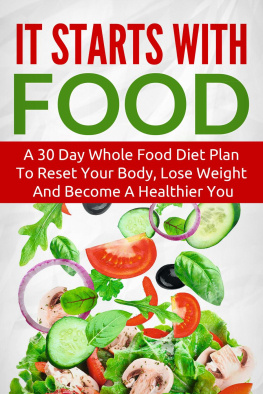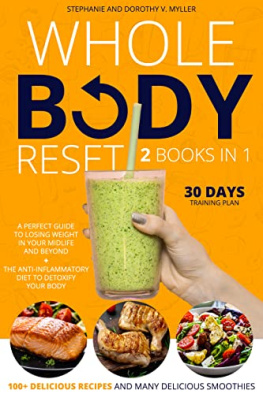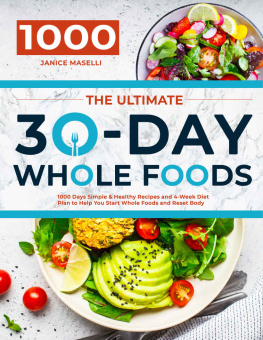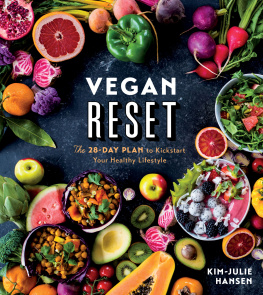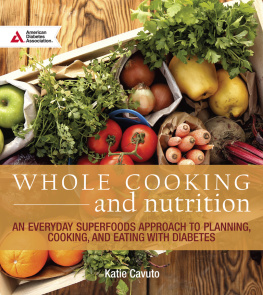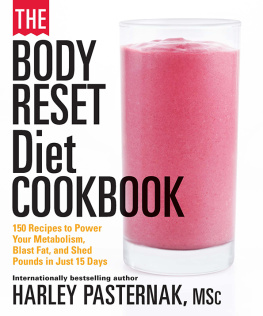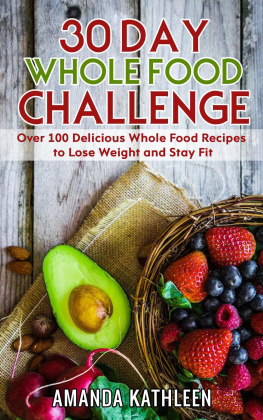Contents
Guide
Foodwise
Includes a 21-day Reset for more vibrant health
Mia Rigden
A Fresh Approach to Nutrition with 100 Delicious Recipes
To Jamie, my hype man, taste tester & forever Reset partner. I love you.
This is not your typical eat this, dont eat that diet book. In fact, this is not a diet book at all. So, if youre looking for that magic bullet or empty promises of flat abs in two weeks, let me be clear: You will not find that here.
What you will find, however, is a path toward food freedom, reconnecting with your taste buds, and feeling great in the body you were born with.
Hi, Im Mia Rigden, a board-certified nutritionist and professionally trained chef. The principles and philosophies found in this book are the result of years of client work and postgraduate studies, as well as my personal experience. My journey began with food. Everyone in my family cooks; both my parents are excellent cooks, and my grandmother was not only the queen of pumpkin pie and roast chicken, but was also an ardent student of nutrition. She studied at Carnegie Mellon in the 1930s and was always ahead of her time, cooking with and slathering coconut oil all over herself in the 1990s when popular nutrition culture wouldnt touch fat with a ten-foot pole.
I started working in restaurants when I was fifteen. First as a host, then a server, and after college I moved to New York and enrolled at The French Culinary Institute (now part of the Institute for Culinary Education). I had an exciting career in restaurant public relations, during which I worked with some of the top restaurants and chefs in the city. It was a twenty-five-year-olds dream: free meals and choice reservations at all the hot spots. I loved it, until I didnt. At some point, all the dining out (and lets be honest, going out) took its toll. I had gained weight and felt off, so I started to experiment with different cleanses, diets, and fitness programs. I was constantly oscillating from periods of extreme healthy eating to indulgent nights out for work and with friends. I loved how I felt when I was eating clean, but that rigidity was at odds with my career and my social life, and I couldnt figure out how to align those forces.
A chance encounter at a friends roller derby disco birthday party in New York City introduced me to my husband, Jamie, a charming Brit with an expiring visa. He was unable to stay in the United States, so his company transferred him to Hong Kong, and I went with him. Leaving the hustle in New York gave me the time and space to hone my passion for nutrition and cooking while I traveled throughout Asia, learning about the cultures and traditions of the East.
I went to India right around the time I finished the first part of my nutrition educationa health-coaching certification program from the Institute for Integrative Nutrition. Clich, I know, but stick with me. One lazy afternoon after a morning of sightseeing in a small village outside Jaipur, I was lounging by the hotel pool reading Deepak Chopras Perfect Health and came across rasa, a Sanskrit word that has many meanings, but among them, taste. In Ayurveda, the concept of taste has so much more depth than the way its commonly used in the West; taste is the essence of life. Different flavors are indicative of a foods nutritional properties and can be used to create harmony in both our physical and spiritual bodies. When I read this, a light bulb went off. Everything I had been taught about dieting and wellness was through the lens of restriction, sacrifice, and compromise. It was the angel and the devil on my shoulder, and I didnt think it was possible to have it both ways. As an avid cook and food lover, I struggled with this and had developed an unhealthy relationship with food as a result, but I realized I had it backward; nutrition is about taste. Our body is constantly giving us feedback, we just need to listen to what it is trying to tell us and learn how to respond.
I went on to get a masters in nutrition and integrative health, then became a board-certified nutritionist. In my client work, I aim to help people find that alignment between their actions and their goals, and figure out how to apply nutrition science to their everyday lives in a way that feels sustainable and, dare I say, fun.
Many of my clients come to me fighting through fatigue, constant bloating, headaches, skin issues, food sensitivities, stubborn weight gain, chronic stress, and more. They have tried it all, from paleo and keto to meticulous macro counting, vegan, and carnivore; and spent hundredsif not thousandsof dollars on supplements, books, fitness programs, and meal-delivery services. And while they may have had some level of temporary success trying different programs, they werent able to stick with it and definitely didnt enjoy it. Frustrated, exhausted, and confused, they end up in my office searching for a different approach.
So how do you get to the place where you can eat what you want, weigh what you want, and feel amazing? Well, this is precisely what youre going to learn in this book. Let me break it down for you.
In order to align our taste buds with what our body truly needs, we have to do a little self-discovery. As you learn more about how what you eat affects other areas of your life (like your mood, sleep, energy, and stress levels), you will be more in control of how you feel and naturally gravitate toward food and activities that are supportive of your body.
A few years back, I was working with a client who had gained about twenty pounds since starting a career in finance, had low energy, consistent bloating, and just wasnt feeling herself. In our first session, she pleaded, Please dont take my bagel from me.
I assured her that I wouldnt, but suggested she try out some other breakfasts just to see how they would feel. She went three weeks without her beloved bagel fix, until one Friday morning a colleague of hers ordered some in for the office. She thought, Ive been so good, I deserve this! and went for it.
Later that afternoon she emailed me, saying she had felt tired and bloated all day. She started to question whether she even liked bagels and cream cheese anymore. I replied, Well, this might be the best bagel youve ever had.
Why? Because I didnt have to tell her that a food she loved was keeping her from her goals; her relationship with the food changed instinctively. It wasnt a battle of good and bad; she didnt have to start each day with guilt about what she had for breakfast, or feel unsatisfied by her healthy choice. This simply became a personal preference. Now, does this mean she hates bagels and will never have them again? Absolutely not! But a once-everyday food became an occasional food, and switching to a nutrient-dense breakfast changed her whole day: She went from feeling tired, bloated, and craving sugar, to feeling energized, satisfied, and proud of her food choices. What a win!


